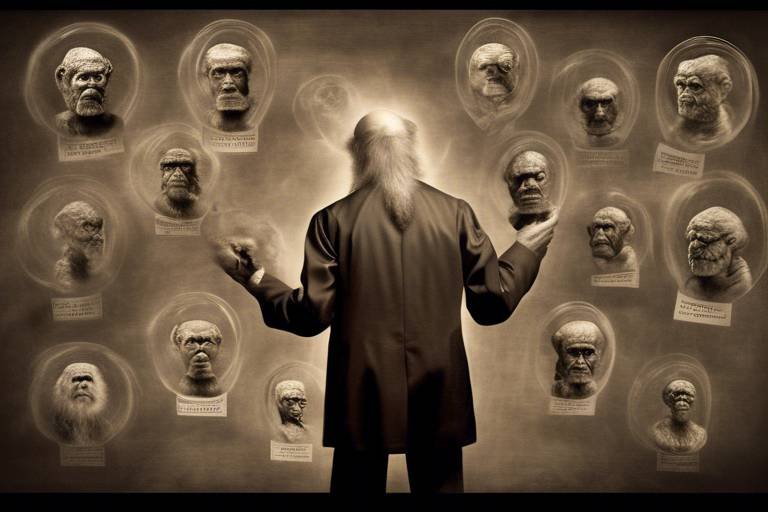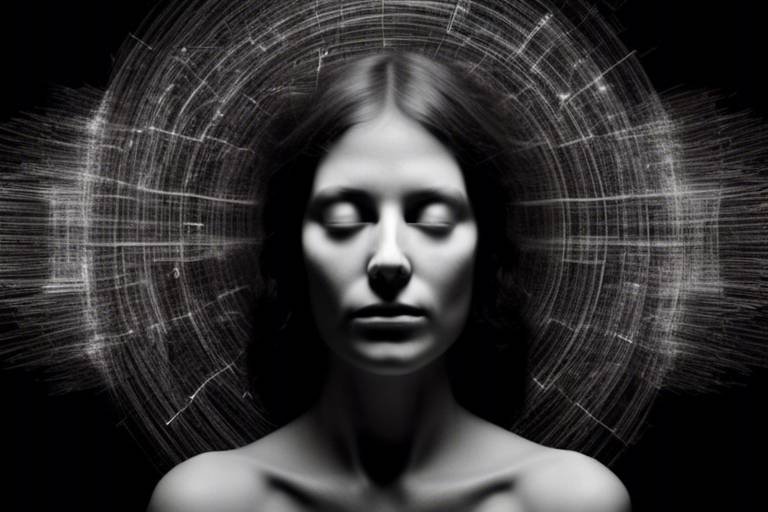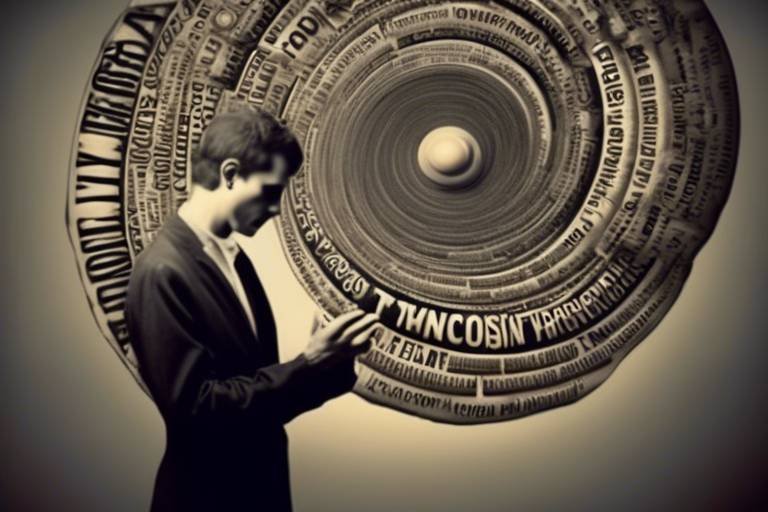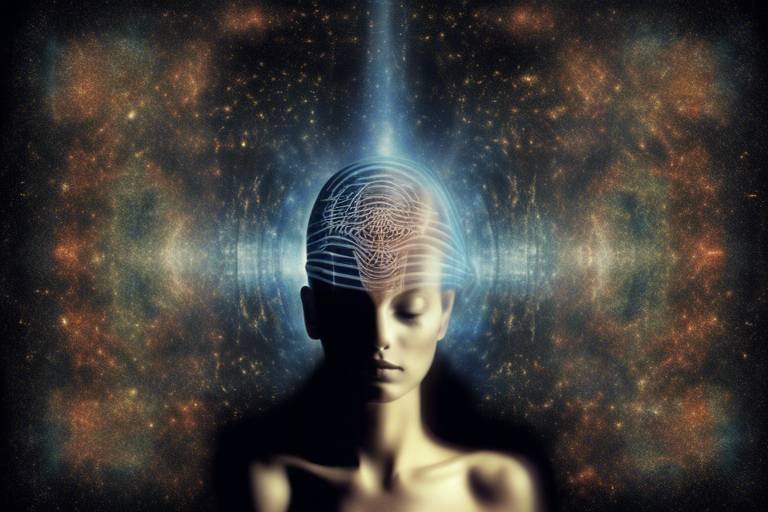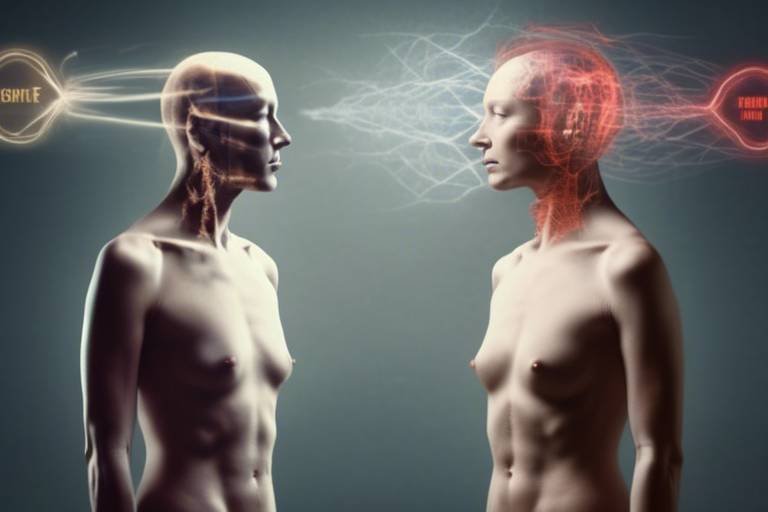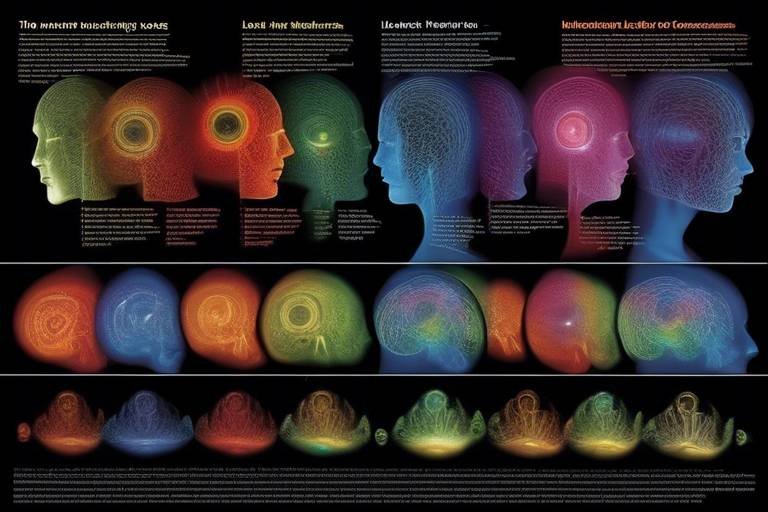Can Darwinian Evolution Explain Consciousness?
When we dive into the depths of consciousness, we often find ourselves grappling with questions that seem as elusive as a wisp of smoke. Can the principles of Darwinian evolution shed light on this intricate phenomenon? To put it simply, consciousness is not just a byproduct of evolution; it may very well be a crucial component of the survival toolkit that our ancestors carried with them. Imagine consciousness as the ultimate survival guide, enabling organisms to navigate their environments, make decisions, and interact socially. But how exactly did this remarkable ability evolve?
The relationship between consciousness and evolution is a complex tapestry woven from threads of biology, psychology, and philosophy. As we explore this connection, we must consider various perspectives that seek to bridge these profound concepts. From the evolutionary advantages of being aware of one’s surroundings to the cognitive processes that underpin decision-making, it’s clear that consciousness plays a pivotal role in the journey of life. But does it stem from the same evolutionary processes that shaped our physical forms? This article aims to unravel these questions and delve into the fascinating intersection of evolution and consciousness.
Throughout this exploration, we'll encounter a myriad of theories and viewpoints. Some argue that consciousness is an evolutionary adaptation, while others suggest it may be an emergent property of complex systems. As we peel back the layers, we’ll examine how consciousness might have provided our ancestors with the necessary tools to thrive in an unpredictable world. After all, in the grand theater of life, being aware of the stage—and the actors upon it—can make all the difference.
So, buckle up as we embark on this intellectual journey! We’ll sift through the sands of time, uncovering the evolutionary pathways that might have led to the emergence of consciousness as we know it today. Are you ready to explore how our minds may have evolved alongside our bodies? Let’s dive in!

The Evolution of Consciousness
Understanding how consciousness may have evolved is crucial in grasping the full picture of human experience. It’s like trying to solve a complex puzzle where each piece represents a different aspect of life and awareness. The journey of consciousness isn’t just a straight line; it’s more like a winding road filled with twists and turns, influenced by both biological and environmental factors. Think about it: our ancestors faced numerous challenges in their environments, from finding food to avoiding predators. Each of these challenges likely played a pivotal role in shaping their cognitive abilities.
Biologically, the evolution of consciousness is often linked to the development of the brain. As species evolved, so did their neurological structures. For instance, the increase in brain size relative to body size, particularly in primates, hints at a growing complexity in thought processes. The human brain, with its intricate network of neurons, allows for advanced functions such as self-awareness, problem-solving, and empathy. These traits didn’t just pop up overnight; they were honed through countless generations, driven by the need to adapt and survive in an ever-changing world.
Moreover, environmental factors cannot be overlooked. The social structures and communal living of early humans likely fostered the development of consciousness. When individuals began to live in groups, they needed to communicate, understand social hierarchies, and form alliances. This social complexity may have spurred the evolution of more sophisticated cognitive functions. Imagine living in a tribe where cooperation was key to survival; the ability to understand others' emotions and intentions would be a game-changer. This necessity for social interaction may have acted as a catalyst for the growth of conscious thought.
In summary, the evolution of consciousness is a multidimensional process influenced by a combination of biological advancements and environmental pressures. It’s a fascinating interplay that showcases the adaptability of life. Just like a river carving its way through rock, consciousness has shaped and been shaped by the experiences of countless generations. As we continue to explore this intricate relationship, we uncover more about what it means to be conscious beings navigating the complexities of existence.
As we delve deeper into the fabric of consciousness, it’s essential to consider how these evolutionary processes manifest in our everyday lives. The ability to reflect on our thoughts, make decisions based on past experiences, and even empathize with others is a testament to the evolutionary journey of consciousness. It’s not just about survival; it’s about thriving in a world full of challenges, relationships, and opportunities for growth.

Defining Consciousness
Before we embark on the fascinating journey of understanding how consciousness evolved, it's crucial to first define what we mean by the term "consciousness." This concept is often described as the state of being aware of and able to think about one's own existence, thoughts, and surroundings. But, as simple as that sounds, consciousness is a multifaceted phenomenon that has puzzled scientists, philosophers, and psychologists alike for centuries.
At its core, consciousness encompasses several key elements:
- Self-awareness: This refers to the ability to recognize oneself as an individual, separate from others and the environment. Think of it as looking in a mirror and not just seeing your reflection but understanding that the reflection is you.
- Perception: This involves the processing of sensory information, allowing us to experience the world around us. It's like a movie playing in your mind, where your senses are the cameras capturing every moment.
- Cognitive functions: These are the mental processes that enable us to think, learn, remember, and make decisions. Imagine your brain as a complex computer, constantly processing data and running programs to help you navigate life.
In the realm of psychology, consciousness can be further divided into different states, such as wakefulness, sleep, and altered states induced by meditation or substances. Each of these states presents unique characteristics and implications for our understanding of the mind. For example, when we are awake, our consciousness is typically focused and attentive, while in sleep, it may shift to a more dreamlike state, raising questions about the continuity and nature of our conscious experience.
Moreover, various theories attempt to explain the mechanisms underlying consciousness. Some argue that it is a byproduct of complex neural processes in the brain, while others suggest it might be a fundamental aspect of the universe, akin to space and time. This leads us to ponder: Is consciousness merely an advanced computational function of the brain, or is it something more profound?
Ultimately, defining consciousness is not just an academic exercise; it has profound implications for how we understand ourselves and our place in the natural world. As we continue to explore this enigmatic phenomenon, we must ask ourselves: What does it mean to be conscious, and how does this awareness shape our interactions with the world around us?
- What is consciousness? Consciousness is the state of being aware of and able to think about one's own existence, thoughts, and surroundings.
- How do scientists study consciousness? Scientists study consciousness through various methods, including neuroimaging, behavioral experiments, and philosophical inquiry.
- Is consciousness unique to humans? While humans exhibit complex forms of consciousness, many animals also display varying degrees of self-awareness and cognitive abilities.
- Can consciousness be measured? Currently, there is no definitive way to measure consciousness, but researchers are exploring various indicators and correlates.

Philosophical Perspectives
When we dive into the realm of consciousness, it’s like stepping into a vast ocean of ideas and theories. Philosophers have been pondering the nature of consciousness for centuries, and their inquiries have led to fascinating insights that help us understand not just what consciousness is, but also what it means to be human. One of the most compelling aspects of this philosophical exploration is the debate surrounding dualism and physicalism. These two schools of thought offer contrasting views on the relationship between the mind and the body, and their implications are profound.
At its core, dualism posits that the mind and body are fundamentally different substances. Think of it as trying to mix oil and water; they exist together but remain distinct. Prominent philosophers like René Descartes championed this view, arguing that the mind is a non-physical entity that interacts with the physical body. This perspective raises intriguing questions: If consciousness is separate from the brain, how does it arise? Can it exist independently of the body? These questions challenge our understanding of consciousness and its evolutionary significance.
On the flip side, we have physicalism, which asserts that everything about consciousness can be explained through physical processes. Imagine consciousness as a complex computer program running on the hardware of the brain. According to this view, our thoughts, feelings, and experiences are all products of neural activities. This perspective aligns more closely with Darwinian evolution, suggesting that consciousness is a trait that has developed through natural selection, enhancing our survival and adaptability. But does this mean that consciousness is merely a byproduct of evolution, devoid of deeper meaning? This is where the philosophical debate continues to thrive.
Another interesting perspective is functionalism, which shifts the focus from the substances involved to the functions they perform. In this view, consciousness is defined by its roles and effects rather than its intrinsic nature. It’s like looking at a smartphone; it doesn’t matter what’s inside it, but rather how it functions to make our lives easier. Functionalists argue that as long as a system exhibits behaviors characteristic of consciousness, it should be considered conscious, regardless of its underlying structure. This viewpoint dovetails nicely with evolutionary principles, suggesting that consciousness evolved because it provides adaptive advantages, such as improved decision-making and social interactions.
Ultimately, the philosophical perspectives on consciousness invite us to reflect on our own experiences and what it means to be aware. Are we merely biological machines, or is there something more profound at play? The debate continues, and as we explore the relationship between Darwinian evolution and consciousness, we must remain open to the myriad possibilities that these philosophical inquiries present.

Dualism vs. Physicalism
The debate between dualism and physicalism is pivotal in understanding the nature of consciousness and its relationship to Darwinian evolution. At its core, dualism posits that the mind and body are fundamentally different entities. This perspective, famously championed by philosopher René Descartes, suggests that consciousness exists independently of the physical brain. Dualists argue that while our bodies are made of matter, our thoughts, feelings, and consciousness arise from a non-physical substance. This view raises fascinating questions: If consciousness is separate from the brain, how did it evolve? Could it be that the mind is an emergent property that developed alongside our physical forms, or is it something entirely distinct?
On the other hand, physicalism offers a contrasting viewpoint. This philosophy asserts that everything about consciousness can be explained through physical processes, particularly those occurring in the brain. Physicalists argue that mental states are directly correlated with brain states, indicating that consciousness is a byproduct of biological evolution. They often point to advancements in neuroscience that demonstrate how specific brain activities correspond to certain thoughts or feelings. This leads to the compelling notion that as our ancestors evolved, so too did their cognitive functions, ultimately giving rise to the complex consciousness we experience today.
To illustrate the differences between these two philosophies, consider the following table:
| Aspect | Dualism | Physicalism |
|---|---|---|
| Nature of Mind | Separate from the body | Part of the physical body |
| Evolutionary Perspective | Consciousness evolved independently | Consciousness is a product of evolutionary processes |
| Scientific Support | Limited empirical evidence | Supported by neuroscience |
| Implications for Understanding | Suggests a non-material aspect of existence | Focuses on the material and observable |
While dualism provides a captivating narrative about the soul and consciousness, it often struggles to explain how these non-physical entities interact with our physical bodies. How can something non-material influence our thoughts and actions? In contrast, physicalism, while grounded in scientific inquiry, may overlook the subjective experience of consciousness, reducing it to mere chemical reactions. This raises another question: can the richness of human experience truly be captured by physical explanations alone?
Ultimately, the discussion between dualism and physicalism is not just an academic exercise; it has profound implications for how we understand ourselves and our place in the universe. As we explore the origins of consciousness through the lens of Darwinian evolution, the reconciliation of these two perspectives may offer deeper insights into the human experience. Could it be that as our understanding of the brain evolves, so too will our grasp of consciousness? Only time and further research will tell.
- What is dualism? Dualism is the philosophical view that the mind and body are distinct and separate entities.
- What is physicalism? Physicalism is the belief that everything about consciousness can be explained through physical processes in the brain.
- How do dualism and physicalism relate to consciousness? Dualism suggests consciousness exists independently of the physical brain, while physicalism argues that consciousness is a byproduct of brain activity.
- Can consciousness be fully explained by science? This is a contentious issue; while neuroscience provides insights, the subjective experience of consciousness remains complex and not fully understood.

Functionalism in Consciousness
Functionalism in consciousness is a fascinating perspective that suggests consciousness is not merely a byproduct of biological processes but rather a result of specific mental states and their functions. Imagine consciousness as a complex software program running on the hardware of the brain; it’s the functionality of the program that matters, not just the machine it operates on. This view aligns seamlessly with Darwinian evolution, as it posits that consciousness evolved because it serves vital adaptive functions that enhance survival and reproduction.
At its core, functionalism argues that mental states—such as beliefs, desires, and sensations—are defined by their causal roles in relation to one another and to the external environment. This means that what it means to be conscious is tied to how these mental states interact and influence behavior. For example, if you see a delicious piece of cake, your sensory perception triggers a desire to eat it, which in turn influences your decision-making process. This interplay illustrates how consciousness can be viewed as a series of functions that contribute to an organism's ability to navigate its world effectively.
One of the most compelling aspects of functionalism is its compatibility with the principles of evolution. In evolutionary terms, consciousness could be seen as an adaptive trait that emerged because it provided significant advantages. For instance, consider how consciousness allows for complex social interactions. It enables individuals to understand the intentions and emotions of others, facilitating cooperation and social bonding—traits that are essential for survival in group-living species. In this way, functionalism not only explains consciousness but also highlights its evolutionary significance.
Furthermore, functionalism invites us to consider the implications of artificial intelligence and machine consciousness. If consciousness is fundamentally about the functions performed by mental states, then could a sufficiently advanced AI be considered conscious if it exhibits similar functional behaviors? This question opens a Pandora's box of philosophical and ethical considerations, challenging our understanding of what it means to be conscious and how we relate to other sentient beings.
In summary, functionalism in consciousness provides a robust framework that links mental processes with evolutionary theory. By emphasizing the importance of the functions that consciousness serves, it offers valuable insights into how this complex phenomenon may have developed over time. As we continue to explore the depths of consciousness, functionalism stands as a pivotal perspective that bridges the gap between mind and evolution.
- What is functionalism in consciousness?
Functionalism is a theory that posits that mental states are defined by their functional roles and interactions, rather than by their internal constitution. - How does functionalism relate to Darwinian evolution?
Functionalism aligns with Darwinian evolution by suggesting that consciousness evolved because it provides adaptive advantages that enhance survival and reproduction. - Can artificial intelligence be considered conscious?
This is a debated topic; if consciousness is about the functions performed by mental states, then advanced AI exhibiting similar behaviors could be seen as conscious. - What are some adaptive functions of consciousness?
Adaptive functions include decision-making, social interaction, and the ability to understand the intentions of others, all of which are crucial for survival in social species.

Neuroscientific Approaches
When we dive into the realm of neuroscience, we embark on a journey that seeks to untangle the complex web of consciousness through the lens of brain activity and structure. Neuroscience, at its core, investigates how the brain functions, and how these functions correlate with our conscious experiences. Imagine your brain as a bustling city, where each neuron acts like a traffic signal, guiding the flow of information through intricate pathways. The question then arises: how does this “traffic” translate into the rich tapestry of consciousness that we experience daily?
Recent advancements in neuroimaging techniques, such as fMRI (functional Magnetic Resonance Imaging) and EEG (Electroencephalography), have provided unprecedented insights into the workings of the brain. These tools allow researchers to observe the brain in action, revealing which areas light up during specific tasks or experiences. For instance, when we engage in complex problem-solving or experience emotions, distinct regions of the brain become activated. This correlation between brain activity and conscious experience suggests that consciousness might not be a singular entity but rather a symphony of neural processes.
One fascinating aspect of neuroscience is the identification of neural correlates of consciousness (NCCs). These are specific brain states or patterns of activity that are consistently associated with conscious awareness. For example, studies have shown that the prefrontal cortex plays a crucial role in self-awareness and reflective thought, while the thalamus acts as a relay station for sensory information, contributing to our perceptual experiences. Understanding these correlations helps to bridge the gap between the biological underpinnings of consciousness and the subjective experiences that define our existence.
However, it’s essential to recognize that while neuroscience provides valuable tools and insights, it does not fully answer the question of how consciousness arises. This leads us to ponder the “hard problem of consciousness”, a term coined by philosopher David Chalmers. This problem challenges us to explain why and how subjective experiences arise from neural processes. In essence, while we can map brain activity to certain behaviors or experiences, the transition from mere biological functions to rich, qualitative experiences remains elusive.
To illustrate this further, let’s consider the following table that summarizes some key findings in neuroscientific research related to consciousness:
| Research Study | Key Findings |
|---|---|
| Dehaene et al. (2006) | Identified the role of the prefrontal cortex in conscious decision-making. |
| Tononi & Koch (2015) | Proposed the Integrated Information Theory (IIT) to explain consciousness. |
| Crick & Koch (1990) | Explored the neural correlates of visual awareness. |
In conclusion, the neuroscientific approach to understanding consciousness is a dynamic and evolving field. As we continue to explore the intricate workings of the brain, we uncover layers of complexity that challenge our understanding of what it means to be conscious. The interplay between neural activity and conscious experience invites us to reflect on our own awareness and the very nature of existence. So, as we ponder these profound questions, we must remain open to the possibility that consciousness may be one of the most intricate puzzles humanity has yet to solve.
- What is consciousness? Consciousness is the state of being aware of and able to think about one's own existence, thoughts, and surroundings.
- How does neuroscience study consciousness? Neuroscience studies consciousness by examining brain activity and identifying neural correlates that correspond with conscious experiences.
- What is the hard problem of consciousness? The hard problem of consciousness refers to the challenge of explaining how and why we have subjective experiences arising from neural processes.

Evolutionary Psychology and Consciousness
When we think about consciousness, it’s easy to get lost in the complexities of the mind. However, when we filter this through the lens of evolutionary psychology, things start to become clearer. Evolutionary psychology seeks to understand how our psychological traits and behaviors have been shaped by the forces of evolution. In this context, consciousness is not just a byproduct of brain activity; rather, it emerges as a crucial adaptation that has allowed humans to survive and thrive in a complex world.
Imagine consciousness as a sophisticated tool that our ancestors developed over millennia. Just like a Swiss Army knife, it has multiple functions that have helped us navigate the challenges of life. One of the primary advantages of consciousness is decision-making. Early humans faced numerous threats, from predators to environmental hazards. The ability to reflect on past experiences, weigh options, and foresee potential outcomes likely provided significant survival benefits. This capacity for foresight and planning is a hallmark of conscious thought, setting us apart from many other species.
Moreover, consciousness plays a pivotal role in social interaction. Humans are inherently social creatures, and our ability to understand and interpret the thoughts and feelings of others—often referred to as theory of mind—is a key component of our conscious experience. This social consciousness allows for empathy, cooperation, and the formation of complex social structures. In evolutionary terms, those who could effectively navigate social relationships were more likely to survive and reproduce, passing on these advantageous traits to future generations.
However, it’s essential to recognize that the evolutionary perspective on consciousness is not without its challenges. Critics argue that while evolutionary psychology provides valuable insights, it can sometimes oversimplify the complexities of human behavior. For instance, attributing certain traits solely to evolutionary pressures may overlook the influence of culture, environment, and individual experiences. This brings us to the limitations of the evolutionary perspective, which we will explore further.
In summary, evolutionary psychology offers a fascinating lens through which to examine consciousness. By understanding the adaptive functions of consciousness, we can appreciate its role in our survival and social dynamics. Yet, as we delve deeper into this relationship, we must remain open to the nuances and complexities that shape our conscious experience.
- What is the main idea behind evolutionary psychology?
Evolutionary psychology suggests that many human behaviors and traits have evolved to solve problems faced by our ancestors, providing adaptive advantages for survival and reproduction. - How does consciousness relate to evolutionary psychology?
Consciousness is viewed as an adaptive trait that enhances decision-making and social interaction, which are crucial for survival in complex environments. - Are there limitations to the evolutionary perspective on consciousness?
Yes, critics argue that it can oversimplify human behavior, neglecting the roles of culture and individual experiences in shaping consciousness.

Adaptive Functions of Consciousness
When we think about consciousness, it’s easy to get lost in the deep philosophical waters of what it actually means. However, if we take a step back and consider its adaptive functions, the picture becomes clearer. Consciousness isn't just a byproduct of evolution; it serves vital roles that have likely enhanced our survival and social interactions throughout history. Imagine consciousness as a sophisticated navigation system that helps us steer through the complexities of life. But how does it actually help us?
One of the most significant adaptive functions of consciousness is decision-making. In the wild, the ability to make choices can be the difference between life and death. For instance, consider a scenario where a prey animal must decide whether to flee from a potential predator or stay hidden. Conscious awareness allows the animal to assess its environment, weighing the risks and benefits of each option. This ability to evaluate situations and predict outcomes is crucial for survival.
Moreover, consciousness plays a pivotal role in social interactions. Humans are inherently social creatures, and our survival has depended on our ability to form relationships and work collaboratively. Consciousness enables us to understand others' feelings, intentions, and perspectives—essentially, it allows us to read social cues. This skill not only helps us build alliances but also fosters empathy, which is crucial in maintaining social bonds. Just think about how a simple smile or a frown can convey so much without a word being spoken!
Another fascinating aspect of consciousness is its role in learning and adaptation. The ability to reflect on past experiences and learn from them is a hallmark of conscious thought. For instance, if an early human faced danger from a wild animal, the conscious recollection of that experience could inform future behaviors, such as avoiding that area or developing strategies for defense. This capacity for learning and adaptation has undoubtedly shaped the evolutionary pathways of many species, including our own.
Additionally, consciousness allows for the development of complex cognitive functions. These functions include problem-solving, planning, and creativity, which have all provided significant advantages in navigating life's challenges. For example, the ability to plan for the future—whether it's gathering food for winter or strategizing for a hunt—demonstrates how consciousness enhances our ability to thrive in varying environments. Think of it as having a mental toolbox filled with various tools that help us tackle different problems effectively.
To summarize, the adaptive functions of consciousness are multifaceted and essential for survival. They encompass decision-making, social interaction, learning, and cognitive functions, all of which have played a critical role in our evolutionary journey. As we continue to explore the depths of consciousness, it’s clear that this phenomenon is not just an abstract concept but a vital aspect of what makes us human.
- What is consciousness? Consciousness refers to the state of being aware of and able to think about one's own existence, thoughts, and surroundings.
- How does consciousness evolve? Consciousness may evolve as a result of natural selection, providing adaptive advantages in decision-making, social interactions, and learning.
- What are the main functions of consciousness? The main functions include decision-making, social interactions, learning from experiences, and facilitating complex cognitive processes.

Limitations of the Evolutionary Perspective
While Darwinian evolution provides a robust framework for understanding many aspects of biological development, it is not without its limitations, especially when it comes to explaining the complex phenomenon of consciousness. One significant challenge is the difficulty in establishing a direct link between evolutionary processes and the emergence of conscious thought. For instance, while we can observe the evolution of physical traits through natural selection, the evolution of subjective experience remains elusive. How do we measure something as abstract as consciousness in evolutionary terms?
Moreover, the evolutionary perspective often relies on the assumption that all traits serve an adaptive purpose. However, consciousness may not fit neatly into this model. Some argue that consciousness could be a byproduct of other evolutionary adaptations rather than a direct adaptation itself. This raises the question: if consciousness is merely an accidental offshoot, what does that mean for its significance in the grand scheme of evolution?
Another limitation is the inherent challenge of defining consciousness itself. The term encompasses a wide range of experiences and states, from basic awareness to complex self-reflection. This ambiguity complicates any attempt to study consciousness through an evolutionary lens. For example, consider the difference between a simple organism reacting to stimuli and a human contemplating existence. Are these two forms of consciousness on the same spectrum, or are they fundamentally different?
Furthermore, the evolutionary perspective may overlook cultural and social influences on consciousness. While biological evolution shapes the brain and its functions, human consciousness is also profoundly affected by cultural evolution. Language, social norms, and shared experiences play a crucial role in shaping how we think and perceive the world. Ignoring these factors can lead to an incomplete understanding of consciousness.
In addition, there are philosophical critiques of the evolutionary perspective that challenge its ability to fully explain consciousness. For example, dualists argue that consciousness cannot be reduced to mere biological processes, suggesting that there is a non-physical aspect to our conscious experience. This viewpoint emphasizes the need for a more comprehensive approach that integrates both biological and non-biological factors.
Finally, the limitations of the evolutionary perspective can also be seen in its inability to address the qualitative aspects of consciousness—what it feels like to be conscious. This subjective dimension, often referred to as qualia, poses significant challenges for evolutionary explanations. How can a purely mechanistic view of evolution account for the rich tapestry of human experience? This question invites further exploration and dialogue among scientists, philosophers, and psychologists alike.
In summary, while Darwinian evolution offers valuable insights into the biological basis of consciousness, it falls short in several areas. The challenges of linking evolution to subjective experience, defining consciousness, considering cultural influences, and addressing philosophical critiques highlight the complexity of this topic. As we continue to explore the relationship between evolution and consciousness, it becomes clear that a multidisciplinary approach may be necessary to unravel the mysteries of the mind.
- What is consciousness? Consciousness refers to the state of being aware of and able to think about one's own existence, thoughts, and surroundings.
- How does Darwinian evolution relate to consciousness? Darwinian evolution provides a framework for understanding how biological traits, including aspects of consciousness, may have developed over time through natural selection.
- What are the main criticisms of the evolutionary perspective on consciousness? Criticisms include the difficulty in linking consciousness directly to evolutionary processes, the ambiguity in defining consciousness, and the neglect of cultural influences.
- Can consciousness be explained purely through biological processes? This is a contentious issue; while some argue for a purely biological explanation, others suggest that consciousness encompasses non-physical elements.
Frequently Asked Questions
- What is consciousness in the context of Darwinian evolution?
Consciousness, when examined through the lens of Darwinian evolution, refers to the awareness and perception that living organisms develop over time. It is believed to have evolved as a means of enhancing survival and adaptation, allowing creatures to respond to their environments more effectively.
- How did consciousness evolve?
The evolution of consciousness is thought to be influenced by both biological and environmental factors. As species adapted to their surroundings, those with advanced cognitive functions—like problem-solving and social interaction—were more likely to survive and reproduce, thus passing on these traits.
- What are the major philosophical perspectives on consciousness?
Philosophical perspectives on consciousness include dualism, which posits that the mind and body are separate, and physicalism, which argues that everything about consciousness can be explained by physical processes. These debates are crucial for understanding how consciousness may fit into the framework of Darwinian evolution.
- What role does neuroscience play in understanding consciousness?
Neuroscience provides empirical evidence about consciousness by studying brain functions and neural correlates. Research in this field helps to uncover how conscious experiences arise from brain activity and how these processes may have evolved over time.
- How does evolutionary psychology relate to consciousness?
Evolutionary psychology examines how psychological traits, including aspects of consciousness, have been shaped by evolutionary pressures. This field suggests that consciousness may have offered adaptive advantages, enhancing decision-making and social interactions that were vital for survival.
- What are some limitations of the evolutionary perspective on consciousness?
While the evolutionary perspective offers valuable insights, it is not without limitations. Critics argue that it may oversimplify the complexities of consciousness and overlook alternative explanations that could provide a more comprehensive understanding of this profound phenomenon.

